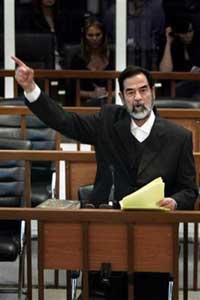|
Saddam urges Iraqis to unite against US
(AP)
Updated: 2006-03-16 07:41
Saddam Hussein, testifying Wednesday for the first time in his trial, called
on Iraqis to stop killing each other and instead fight U.S. troops. The judge
reprimanded him for making a rambling, political speech and ordered the TV
cameras switched off.
Saddam began his speech by declaring he was the elected president, touching
off a shouting match with chief judge Raouf Abdel-Rahman.

Saddam Hussein
argues with Chief Judge Raouf Rashid Abdel-Rahman, not pictured, while
reporters watch from a gallery behind, moments before the judge closed the
court to the press, in Baghdad, Iraq, Wednesday, March 15, 2006.
[AP] | "You used to be a head of state. You are a
defendant now," Abdel-Rahman told him.
Saddam, dressed in a black suit and wearing large reading glasses, repeatedly
brushed off the judge's demands that he address the charges against him 锟斤拷 the
killing of 148 Shiites and the imprisonment and torture of others during a
crackdown in the 1980s.
Instead, he read from a prepared text, addressing the "great Iraqi people" 锟斤拷
a phrase he often used in his presidential speeches 锟斤拷 and said he was "pained"
by the recent wave of Sunni-Shiite violence.
"Let the people unite and resist the invaders and their backers. Don't fight
among yourselves," he said, praising the insurgency.
"In your resistance to the invasion by the Americans and Zionists and their
allies, you were great. You were great in my eyes and you remain so. ... It's
only a matter of time until the sun rises and you'll be victorious," he said.
Abdel-Rahman shouted at him again and closed the session for 90 minutes,
ordering journalists out of the room and the delayed broadcast cut while Saddam
finished reading his speech.
The stormy exchanges were a stark contrast to the past few sessions, when
each of Saddam's seven co-defendants took the stand, one by one, and were
questioned by the judge and prosecutor about the crackdown in the Shiite town of
Dujail after a 1982 assassination attempt on the then-Iraqi president.
Even Saddam's half-brother, former intelligence chief Barzan Ibrahim 锟斤拷 who
has frequently caused an uproar in the court in the past 锟斤拷 submitted to more
than three hours of questioning earlier Wednesday. He denied any role in the
crackdown, and as prosecutors presented a series of intelligence memos on the
arrests allegedly with his signatures, he insisted each was a forgery.
Prosecutors will have another chance to try to question Saddam on the charges
when the trial reconvenes April 5.
But in Wednesday's session, Saddam sought to project the image of a man still
in power addressing his people in troubled times, even as Abdel-Rahman
repeatedly stabbed a button on his desk to shut off Saddam's microphone.
At one point, the judge screamed, "Respect yourself!" Saddam shouted back:
"You respect yourself!"
"You are a defendant in a major criminal case, concerning the killing of
innocents. You have to respond to this charge," Abdel-Rahman told him.
"What about those who are dying in Baghdad? Are they not innocents?" Saddam
replied. "I am talking to the Iraqi people."
In his speech, Saddam told Iraqis that "of all religions and sects ... I do
not discriminate among you."
"What pains me most is what I heard recently about something that aims to
harm our people," he said, referring to Shiite-Sunni violence that has rocked
the country since the bombing of a major Shiite shrine in Samarra last month.
He blamed "criminals" for the shrine bombing and the attacks on Sunni mosques
that followed, and urged Iraqis to unite. "What happened in the last days is
bad," he said. "You will live in darkness and rivers of blood for no reason."
"The bloodshed that they (the Americans) have caused to the Iraqi people only
made them more intent and strong to evict the foreigners from their land and
liberate their country," he said.
After Abdel-Rahman closed the session, Saddam finished reading his speech.
Former U.S. attorney general Ramsey Clark, who is a member of Saddam's
defense team, told CNN the speech explained the context of the time period in
which the Dujail events took place, arguing the legality of the government
actions while Iraq was at war with Iran.
But Clark said the judge "threatened us with prosecution if we release what
(Saddam) said."
Saddam argued further with Abdel-Rahman, complaining about the closing of the
session and insisting he wanted to help stop the violence. "I am trying to
extinguish the fire with few drops of water," he said, according to a person
close to the trial, speaking on condition of anonymity because of the judge's
gag order.
When journalists returned to the court, Saddam was sitting alone in the
defendants' pen. The chief prosecutor tried to question him, but he refused,
demanding first to see a copy of an affidavit he made to investigators before
the trial. Abdel-Rahman ordered that he be given a copy and adjourned the trial
until April 5.
Saddam and the seven former members of his regime face possible execution by
hanging if they are convicted in connection with the crackdown launched in
Dujail following a July 8, 1982 shooting attack on Saddam's motorcade in the
town.
In a March 1 session, Saddam stood up in court and boldly acknowledged that
he ordered the 148 Shiites put on trial before his Revolutionary Court, which
eventually sentenced them all to death. But Saddam insisted it was his right to
do so since they were suspected in the attempt to kill him.
The defense has argued that Saddam's government acted within its rights to
respond after the assassination attempt. The prosecutor has sought to show that
the crackdown went well beyond the planners of the attack to punish Dujail's
civilian population, saying entire families were arrested and tortured and that
the 148 who were killed were sentenced to death without a proper
trial.
|